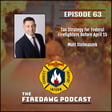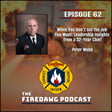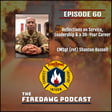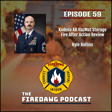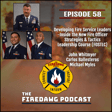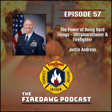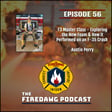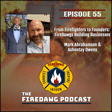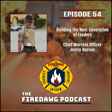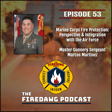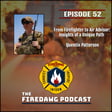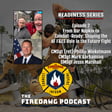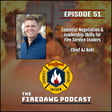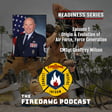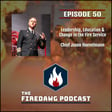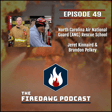Become a Creator today!Start creating today - Share your story with the world!
Start for free
00:00:00
00:00:01

Table Talk 07. Risk vs. Reward: When to Push Forward, When to Hold Back
In this episode of the Table Talk Series, Chris shares a real-life story from Indianapolis about a firefighter who took a big risk and successfully made a daring rescue. He and Matt break down the "Risk vs. Reward" threshold—when should you risk a lot to save a lot, and when should you pull back? Every firefighter has their own approach, but one thing is certain: preparation, training, and discipline are key. Tune in to hear how Chris and Matt explore where that line falls and why being ready for any challenge is crucial in the fire service.
Transcript
Introduction to Table Talk Series
00:00:00
Speaker
This is the Firedog Podcast.
00:00:13
Speaker
Welcome. My name is Matt Wilson. Thank you for listening to the Table Talk series on the Firedog Podcast. The Table Talk series is a free flowing conversation between friends and peers on topics like reading, leadership, successes, failures, fire ground tactics, and much more. It's the kind of conversations you'd have around the kitchen table at your firehouse. These are the conversations we have all the time. And at the Firedog Podcast, we thought it was a good idea to record and share some of them.
Understanding Risk-Reward in Firefighting
00:00:34
Speaker
Today, Chris Boykley and I dive into the risk reward threshold.
00:00:38
Speaker
When should you risk a lot to save a lot? and When should you risk a little to save a little? The answer might vary depending on who you ask. And in some situations, different firefighters make different calls. One thing is certain preparation training discipline are key. In high-risk, high-reward scenarios, you'll only be as successful as your training allows. You'll fall back to your minimum level of preparation.
00:00:58
Speaker
In this episode, k Chris and I explore that risk-reward line and why your training preparation is so crucial. Chris also shares a real-life story about a firefighter in indian Indianapolis who pushed the limit and made a
A High-Stakes Rescue in Indianapolis
00:01:10
Speaker
successful rescue. Take a listen and try to imagine what you would have done in a similar situation. Are you ready for a similar challenge? After you've listened, join us on the Firedoll Mentorship Facebook group or visit any of our social media pages to continue the conversation.
00:01:26
Speaker
right so In this episode of Table Talk, Matt and I wanted to kind of dig into this whole idea of risk a lot to save a lot. That's something we all you know learn early on in the Fire Academy, this idea that you know we're going to risk a lot if the stakes are high and there's a lot to be saved. um and I want to kind of kick this off by um reading an excerpt from a fire that um has made me think a lot about that concept and a lot about um this job in general and the commitment that each of us has made as firefighters. There aren't enough adjectives to adequately describe the events that surrounded the run on 31 Bankers Lane on Saturday, November 23rd, 2019.
00:02:17
Speaker
For this group of firefighters, multiple obstacles creating confusion and chaos awaited them as they began to arrive on scene. While in route, Fire Control fire control relayed that PD was on scene reporting confirmed entrapment. The police department had received the initial calls of domestic and discovered an apartment fire when they got there. Engine and Ladder 20 arrived first reporting heavy smoke showing from two floors, zero access for apparatus to the front of the building and hydrant placement that made getting water challenging. Engine 20 established first water with Engine 25 getting a secondary supply line upon their arrival. Crews were faced with extensive layouts and the need for yard lays which would allow them to stretch their attack lines to the second and third floors.
00:03:05
Speaker
While this was going on, Ladder 20 began the process of ground ladder deployment to the front of the structure, rescuing a person trapped on the third floor. Another crew member member attempted to enter search a third floor window, but was pushed back by intense heat. Crews from Engine 27, the third engine on scene, worked to extinguish fire from the exterior of the seaside as crews from Engine 20 and 25 began to stretch attack lines to the second and third floors.
00:03:34
Speaker
During this time, Squad 10 arrived. They entered the west side of the building and made their way to the second floor. While awaiting water and a heavily charged second floor stairwell, Adam Godey and his officer were at the ready, anxious to get to the third floor where a woman was reportedly trapped. The heat was intense. Face shields of those on the line in the hallway were compromised and starting to degrade.
00:04:00
Speaker
A quick blast of water in the stairwell from Engine 20's nozzleman allowed Adam Godey of Squad 10 to bolt past the nozzle and head to the third floor, which he discovered was as heavily involved in fire as the second. Adam retreated back downstairs, quickly regained his composure and told himself to go back. Risk a lot to save a lot.
00:04:24
Speaker
Back to the third floor, Adam entered the apartment. The doorframe was on fire. Everything in the front room was on fire. The heat was intense. Adam was low and crawling as fast as he possibly could. The sudden realization that he could feel his skin burning underneath his turnout coat grounded him in the reality of his current situation, but forced the narrative in Adam's head to push him even further. Adam said, I knew I was burning.
00:04:51
Speaker
But if I could crawl fast and do a quick search, I knew I had a chance of finding her. Due to the free burn burning fire in the front room, visibility was good and Adam could see the woman was not in there. Heading towards the rear, Adam entered a bedroom chock full of black smoke with zero visibility. He felt a bed and got on top of it to search. He found nothing. Simultaneously, crews maintained aggressive efforts throughout the building, extinguishing fire as searches continued.
00:05:21
Speaker
By the time Adam hit the bedroom, his face mask was completely compromised and he couldn't see a thing. Suddenly he felt water. An engine crew had a hand line at the window of the bedroom. Another firefighter tried to enter through the window, but sustained burns to his face as soon as he stuck his head in. He retreated and maintained an exterior position at the window. Adam yelled to keep throwing water. It was hot. He was burning and he needed to buy a little more time.
00:05:51
Speaker
Knowing that he was able to make verbal contact with firefighters nearby allowed Adam to maintain his focus and provided a compass for rapid egress if he needed it. He said it reassured him that he knew where he was and that they had his back.
00:06:06
Speaker
Adam made his way down the hall and found a locked door he hoped was another bedroom. Still on hands and knees working under blind conditions, Adam used his halligan tool to breach the door. It was a bathroom. He entered, searched, and within seconds found an unconscious woman in the bathtub.
00:06:24
Speaker
Unable to radio for help, Adam pulled the woman out of the tub towards the bedroom and yelled for assistance. At the window, two firefighters entered the bedroom and assisted Adam in getting her up off the floor and out onto the ground ladder. Adam says the entire effort from this initial entry from the stairwell waiting for water to bringing the woman to the window was about four minutes.
00:06:48
Speaker
Despite all the reasons to slow down, wait for assistance or retreat and wait for water, Adam never once thought of giving up. He felt compelled to keep searching. The woman was transported in critical condition to a local hospital and thankfully survived her near fatal experience.
Debating the Risks of Heroic Actions
00:07:07
Speaker
She has made a full recovery. Man, that's an incredible story. It's a great story. And I guess,
00:07:17
Speaker
in spirit of you know the risk a lot, save a lot conversation, I guess it's hard to discern where the line is. And in his case, Adam's case, he kind of decided for himself, but this could have also went terribly wrong for him potentially, um but incredible story.
00:07:44
Speaker
Man, this is one. So I ah tell this story at every class of the, the DOD firefighter rescue and survival school. Um, and to be fair all all week, we prime the students with NIOSH reports for every single skill and drill, um, that they're completing. And so I tell this story and every single student thinks I'm teeing up another line of duty death. And it very well could have been. Sure.
00:08:12
Speaker
Think about this fire. Had they not been on that window in the bedroom, had visibility not been what it was, he could have easily, and the fact that his face mask was compromising or compromised almost completely, he was probably minutes away.
00:08:32
Speaker
or, no ah you know, no water without water. he He'd be within minutes, within very few minutes, you know, dead himself. But yeah, this is like the the the beginnings of this or the beginnings of the story. Yeah. Like you mentioned, it could have very easily been a line of duty death. I think of all the things that were not textbook. Right.
00:09:01
Speaker
you know, bolting past the hand line or pushing through a room on fire, right? Numerous things that would violate NFPA standards, AFI's, ah s SOP's. Sure. And there's a lady alive because of it. Sure.
00:09:18
Speaker
I wonder, do you know if anything changed as a result or was there any kind of, I guess, any, anything, I don't want to say disciplinary, you know, you had mentioned that he received the medal of valor and I don't know if you mentioned that on this recording, but I know you texted me that I wonder if anything came of this. Yeah. Um, man, not that I know of, it was a, it was a controversial thing. Sure. Right. Where, um,
00:09:47
Speaker
You know, at Adam got a lot of credit for doing what he did and he got a lot of criticism for it at the same time. And, you know, largely, you know, people ah in support of it, right? It worked out well, um but it could have not worked out too.
Impact of Training on Risk Assessment
00:10:07
Speaker
Right. And I picture that, that NIOSH report with all the contributing factors that would have aired out, um you know,
00:10:16
Speaker
all the little issues, all the little things that weren't textbook, chair if it had gone the other way. sure And that that's what's made me think about this whole concept of risk a lot to save a lot. Yeah. And again, that that yeah, that where's the line for that? Where's the threshold? And how do you know how do you know when to push forward and when to not? And I don't think that training can necessarily teach for that.
00:10:43
Speaker
I want to agree with that. I don't even know that there's a right answer, right? Like you've got an apartment just chugging with heavy black smoke. Is it a go or a no go? Right. Right. Or now police are reporting confirmed entrapment. Does that make it go or no go? Right. ah There's no water. Is it a go or a no go? Right.
00:11:12
Speaker
You feel your skin actively burning underneath your turnout. I'm not saying there's a right or wrong answer to any of those things, but to me now, that's what risk a lot to save a lot looks like deciding, you know, if trying to put yourself in those positions mentally and deciding where the line is for you.
00:11:38
Speaker
It's a tough place as a leader, let's say, as a battalion chief or even a company officer, because you can't you can't be expected to tell someone else to go do what he did, because he, I would assume, has permanent disability of some kind, or at the very least, some some scars from burning his skin. I don't know if that be if that's true or not.
00:12:08
Speaker
So that's another, just from the leadership perspective, you can't be expected to tell somebody to go do what he did. I think it's no matter where you are, right? And correct me if I'm wrong, but that's really, it's a decision that's up to the individual. Yep. I would totally agree with that. I think, um, you know, there's a certain, um, certain, um,
00:12:31
Speaker
responsibility that we all have as a minimum standard. to risk a lot to save a lot, right? The the fire protection badge that we all wear says that we've committed to hang it out there if other lives are on the line. Sure. you know What decisions do you make under under those conditions, that's a soul searching type thing. Yeah, I wonder, arguments made against what he did
00:13:05
Speaker
I guess how imminent was the availability of water at the top of the stairs, right? um could and you know you You could play Monday morning quarterback all day, but you know had he waited a little while longer, how long before water and how long before it was ah acceptable, quote unquote, to make a push and um how protected was this person in the bathroom with the door closed, I think you probably could make arguments in favor of of you know of of those points. yeah But again, you know yeah but you you can only make
Personal Preparation and Responsibility
00:13:45
Speaker
the best decision. you know yeah It's hard to criticize the person, the the man in the arena, for like a better term, right like with with seconds to spare and and all of those unknowns. you know I guess I'm
00:13:59
Speaker
I'm reluctant to to be a critic ah critic of that, of the decisions that he made. And obviously it worked out for him and and the person that he saved. Yeah. You know, he he talks about um how his decision making, how clear it was where he knew water was coming. He knew due to the construction of the building, you know, it was a ah block building. He knew he had time that it wasn't going to collapse.
00:14:26
Speaker
um And he knew that that was the apartment. He said there was no doubt in his mind that but there was somebody trapped in that apartment. The combination of those three things made the decision. So it was an informed decision, I guess to your point. It wasn't a knee jerk reaction. It was an informed decision. um yeah he He considered the construction. He considered the fact that somebody was known missing.
00:14:56
Speaker
He may have even considered the fact that he, you know, that there were resources on the Charlie side. I don't know if that was mentioned, but I have resources here. I have a secondary means of egress. Yeah. So there, there was a bit of a, you know, there's an algorithm that he used and.
00:15:13
Speaker
It wasn't just cowboy stuff, right? as As we like to call it. So I guess that's a great that's a great point to to enforce, though, to to listeners who may be you know thinking that they can go do whatever they want. But there is a calculus. There was a calculus to his decision making process. Yeah. you know I'll add that so i I get to work with Adam every every third day. He's on the squad in our firehouse. and He's the best I've ever seen because of his preparation. By no means was this save any kind of kamikaze mission. This is a guy that obsesses over the fundamentals, that obsesses over the job in general. And he he gets to people, I wanna say he's gotten to people in burning buildings every year since then. but There might be one year in there since 2019 that he hasn't.
00:16:14
Speaker
ah And it's because he's fast He's smart and he's aggressive The combination of all three things that he prepares for every single shift and I think of all the firefighters that You know, there are plenty of firefighters that are missing one of those things Some that are missing two or maybe all three of those things But if he was fast and smart but not aggressive, not willing to take the heat and make that kind of push, that lady dies every single time. And maybe if he's fast and he's aggressive, but he's not smart, if he didn't have the ability to size up the building and to know where to go and to understand the construction all in a split second, that lady dies every single time. And maybe he's fast and he's aggressive,
00:17:13
Speaker
I'm sorry, maybe he's he's smart and he's aggressive, but he's not very fast. It takes him 60 seconds to mask up instead of 20.
00:17:25
Speaker
That lady dies every single time. And so for our listeners, the the episode we just finished up with Chief Whole Woman, I believe it's episode 50, he talked a lot about adapting and acting and the preparation that goes into having that ability, having the ability to, to perform at that level. I feel like most firefighters have the will to perform at that level, but not near as many have the will to prepare, to perform at that level. Absolutely. Yeah. To your point, it's, there's so much that went into him being ready for that moment that only he knows about, right?
00:18:13
Speaker
And so how prepared are you for a similar moment? I guess is the point, right? ah afford How prepared are all ah all of us for that similar moment? And only you can answer that question, but this isn't a guy who hangs out in the recliner every shift. This is a guy who ah takes every opportunity to be the best possible firefighter that he can be. And had he not done that up to that point,
00:18:39
Speaker
this could have very well been a line of duty death report.
The Role of Discipline in Firefighting
00:18:43
Speaker
Um, and at the very least he wouldn't have saved anybody's life. So yeah, that's a great, no great story to his face. Of course. He's the worst fireman I've ever seen. So I'll ah i'll deny any of this to my death. if Make sure he doesn't listen to it, but making sure he doesn't listen to it. But what ah an aspiration for for any firefighter, right? To be those three things. And to be to be honest with yourself, right? if If you're the firefighter that takes 60 seconds to mask up instead of 20, which is a perfectly achievable goal, work on it, right? Find it any weakness that you have in those three things, whether it's your speed, it's your aggressiveness, or it's your your your smarts on the fire ground. Knowledge, yeah.
00:19:34
Speaker
your knowledge it and work with it, work on it every single shift. Yeah. And how you do one thing is how you do everything, right? And so establishing, I mean, we could go deep into this conversation, but how, uh, you know, establishing good habits, being disciplined and how you, um, how you approach each day, both personally and professionally. Uh, you know, I like to use the example of getting up, you know, going to bed at a decent time and getting up at a decent time so that you have an opportunity to do some kind of physical exercise or, you know, habits like that.
00:20:05
Speaker
believe it or not, translate into your um your ability to prepare. And so so yeah, that that's a great it's a great point to the story is you know being a disciplined and prepared practitioner. Yeah, it's ah it's a habit, not an act, right? It's a ah career-long journey of being prepared to do whatever needs done, no matter what it might be.
00:20:35
Speaker
And maybe that's another another conversation you might have to have with yourself. Maybe you were that firefighter when you first started, but now you're 15 or 20 years into a career. Are you still on that journey? Sure. Yeah, we all have to do everything possible.
00:20:51
Speaker
We all have to look at ourselves in the mirror because, yeah, it is a cyclical thing or you have bad days and bad years or you know things. That's why discipline is so important. and i like the I've heard it said before, but you know motivation is is nothing because motivation is fleeting, but discipline is everything because it you know it establishes those norms for you. um and so How do you find discipline in your life so that you can make it through those down days, those bad days. right You have to establish habits that you that become normal for you and not as daunting, I guess. you know like I use physical exercise. i you know It's just such a foundational thing to so many different things. But you know for me personally, just about i mean I've had surgeries right where I've had to be down um and there's you know I've been injured, of course. but
00:21:47
Speaker
since and I kind of went on this journey in about 2018 as a result of reading a book, Can't Hurt Me by David Goggins, which I wouldn't go to the extremes that he goes to, but I'm sure someone familiar with that book. but you know and And through other books too and through other people that influenced me, but I've decided that that's going to be normal for me.
00:22:09
Speaker
and i And it was tough. yeah There's tough mornings, of course, and there's still tough mornings. But it's just so and it's so ingrained within my mentality that it's just like not even an option not to do it, right? And so I guess ah you have to find that for yourself, both personally and again professionally. you know It's not an option not to be thorough in your truck checkout.
Encouragement for Self-Assessment
00:22:31
Speaker
It's not an option to be under 30 seconds I don't know, masking up or you know getting all your gear on. It's not an option to not know how to force a door within so many seconds. It's not an option to know how to get water out of the truck ah within so many seconds of pulling the brake, right? So I think if you can you know find that within yourself, whatever that means and your respective in your respective job position, you know you have to find that and make it normal. I love the ah but visual of like,
00:23:09
Speaker
of discipline, like you're describing being a muscle. ahlys great way to describe it That your discipline gets stronger the more you exercise it. Yeah. Yeah. It really solidifies.
00:23:27
Speaker
Um, and again, you're gonna have hard days and hard weeks and hard months and maybe hard years and things are going to happen in your life. It's inevitable. It happened to all of us, but man, the more that muscle is exercised, the more you are. Equipped to weather the storms, you know, so yeah, great conversation. Yeah. Yep. So man, I encourage our listeners to,
00:23:54
Speaker
I think there's there's power and even putting through yourself through this kind of thought exercise of one, what what does risk a lot to save a lot look like for you? And maybe two, are are there any there are any weak spots in your game? Are there any things you can do to just tighten up your discipline or tighten up you know your physical ability, your, your skills and abilities in any areas and just start doing it gradually. That's what discipline looks like. It's not this, uh, this one giant like life event. And now you're disciplined. It's all these gradual tightening up to become who you want to be the firefighter that you envision coming for, for your family on your worst day.
00:24:47
Speaker
You know, have that, put yourself through that thought exercise and just pick one thing, one thing to improve through discipline or through training and then move on to the next one. Such a powerful thing over time. Absolutely. So important. Chris, again, man, a good, good story. Good points. I appreciate you, I guess, bringing this up and us recording it, you know, getting us to record it.
00:25:18
Speaker
All right. Until next time, stay safe. All right, brother. See you. Thank you for listening to this episode of the Firedog Podcast. You can find more episodes like this on our website, firedog.us, or wherever you listen to podcasts. We're also active on social media. Connect with us on Facebook, Instagram, and LinkedIn at the Firedog Podcast. That is the Fire DAWG Podcast. Don't forget to subscribe, like, and follow to stay plugged into every new episode. We'd also appreciate it if you'd share this podcast with your friends and coworkers, either on social media or right there within your firehouse. This is Matt Wilson.
00:25:51
Speaker
with Chris Boykley. Until next time, stay safe.
